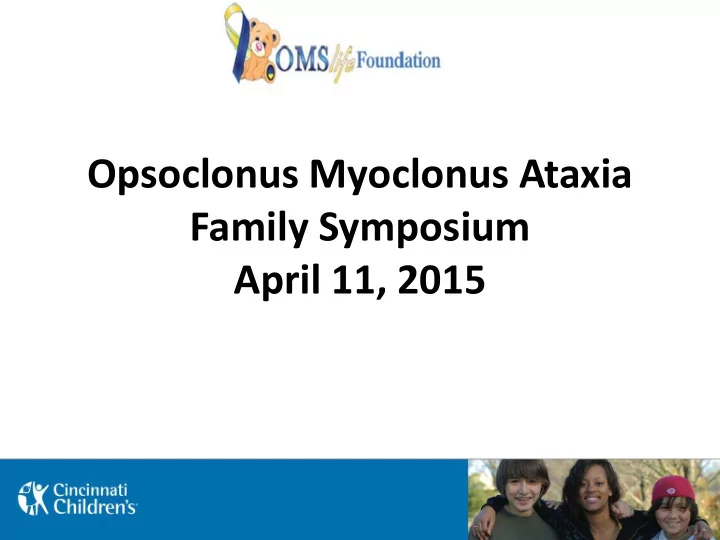

Opsoclonus Myoclonus Ataxia Family Symposium April 11, 2015
Conference Agenda: 11:00AM Mike Michaelis, OMSLife Foundation Welcome and Introductions 11:15AM Donald L. Gilbert MD, MS Movement disorders 12:00PM Dr. Allen DeSena, MD Neuro-immunology 1:00PM Mike Michaelis, The OMSLife Foundation 1:15PM Dr. Brian Weiss, MD Oncology 2:00PM Wendi Lopez, PsyD Behavior, Learning at home and school 3:00PM OMS Caregiver Panel Discussion
Opsoclonus Myoclonus Ataxia Syndrome Neurology/ Movement Disorder Overview Donald L. Gilbert MD MS
Disclosure • None relevant to this talk • Clinical trials (Tourette Syndrome): Psyadon, Otsuka, AstraZeneca
Story • 21 month old completely healthy girl • Walked on time • Uses hands normally – stacks small toys • Very social, not yet toilet trained but interested • Points to objects and body parts • Follows commands with gesture • Has over 20 words
Story • One morning she awoke with a cough and a fever • Over the next two days she had tremors of her body and poor balance. She was fussy. Parents noted some unusual eye movements
Story • She presented to small hospital, where she was admitted for a workup • She underwent blood testing, 2 MRI scans, a 24 hour EEG, and a spinal tap • All tests were normal
Diagnosis?
“Acute Cerebellar Ataxia”
Story continued The girl was sent home with her parents to wait for symptoms to improve
Story continued The symptoms did not improve
Story continued • The child’s pediatrician was not sure what to do • The child was sent to the ER and another MRI was performed, but discharged home again • The pediatrician referred her for a second opinion
Story continued • For 4 weeks she continued to get worse • “Sometimes conditions get worse before they get better” • She is very fussy, has stopped speaking, is very shaky, cannot or will not walk • On the morning of her “second opinion” visit she spikes another fever
Story continued • At the check in at the neurologists office, the medical assistant thinks she is having a seizure she is so shaky • Her eyes are out of control, bouncing up and down really fast so she can’t maintain eye contact with her parents • She is so fussy her parents can’t comfort her
Diagnosis?
Acute Cerebellar Ataxia Opsoclonus Myoclonus (Ataxia) Syndrome
Why is this diagnosis difficult? Feature/ Symptom Opsoclonus Acute Cerebellar myoclonus Ataxia Onset around age Yes Yes two Presents with or Yes Yes after illness Balance problems Yes Yes Hand tremors Yes Yes Eye problems Yes Yes
Lots of causes of acute balance problems in children Category Examples Clinical features, diagnostic essentials Acute Toxic Acute ingestion Alcohol, anticonvulsants, Toddlers – accidental ingestion; Adolescents – substance abuse. antihistamines, Mental status changes common, urine/serum toxicology screen in Emergency benzodiazepines Department may detect unsuspected ingestions. Inflammatory Acute cerebellar ataxia Symmetric cerebellar findings, gait impairment, truncal ataxia, titubation, nystagmus. Mental status normal. Usually post-infectious. Consider opsoclonus myoclonus ataxia syndrome. Trauma/Vascular Stroke, vertebrobasilar dissection Consider after neck trauma or if hypercoagulable. Recurring Metabolic Many inborn errors of metabolism may occur intermittently Can be triggered by intercurrent illness. Consider if child has preexisting intellectual disabilities, positive family history, consanguinity; or presents with encephalopathy and vomiting. Migrainous Basilar migraine, benign paroxysmal In the young child, headache may not be prominent. Initial episode consider focal vertigo pathology and need for imaging. Episodic Ataxias Episodic Ataxia 1, 2 Bouts of dysarthria, gait ataxia, sometimes with characteristic provoking factors. Functional Psychogenic / Functional Neurologic Symptom Disorders Gait disturbance or abnormal tremor-like movements which have fluctuating, on-off time course, variable direction, amplitude, and frequency, and otherwise do not conform to usual pattern of disease. Uneconomical gait, excessive sway without falling may be seen. Subacute Inflammatory Acute Disseminated Mental status changes; and multifocal neurologic deficits. MRI shows multiple Encephalomyelitis (ADEM) discrete lesions involving white and gray matter. Guillain Barre Syndrome, including Miller Fischer Variant Oculomotor paresis, bulbar weakness, hyporeflexia, radicular pain. Risk for respiratory/autonomic failure. Note – weakness localizing peripherally may masquerade as ataxia due to problems with limb control and gait. . Opsoclonus myoclonus ataxia syndrome Truncal ataxia, multifocal myoclonus, opsoclonus (may be transient), behavioral irritability. Paraneoplastic (neuroblastoma) or post-infectious. Mass lesions Posterior fossa neoplasms Headaches, vomiting, papilledema, cranial nerve palsies.
Recommend
More recommend